Abstract
Polynucleotide relationships were examined among many representatives of the Enterobacteriaceae by means of agar, membrane filter, and hydroxyapatite procedures. The amount of deoxyribonucleic acid (DNA) that reassociated was dependent, especially in interspecific reactions, on the annealing temperature. In only three cases: Escherichia coli-Shigella flexneri, Salmonella typhimurium-S. typhi, and Proteus mirabilis-P. vulgaris, was relative interspecific duplex formation 80% or higher. In most cases interspecies DNA duplex formation was 40% or less of that obtained from intraspecies DNA reassociation reactions. The stability of E. coli-S. flexneri DNA duplexes formed at either 60 or 75 C was virtually identical to that of homologous E. coli DNA duplexes, and the degree of interspecies duplex formation was minimally affected by the temperature increase (86% at 60 C; 77% at 75 C). The thermal stability of DNA duplexes formed at 60 C between DNA from E. coli and DNA from strains of Aerobacter aerogenes, S. typhimurium, S. typhi, and P. mirabilis was about 12 to 14 C below that of reassociated E. coli DNA. At 75 C, the formation of the interspecific DNA duplexes was markedly decreased, but the stability of the DNA able to reassociate at this temperature approximated that of reassociated E. coli DNA. The degree of reassociation and the thermal stability of E. coli-S. flexneri DNA duplexes suggests relatively little evolutionary divergence in these organisms. The other enterobacteria tested, however, have diverged to a point where less than one-half of their DNA can reanneal with E. coli DNA at 60 C and less than 10% reacts at 75 C. The degree of divergence between various enterobacteria does not appear to be uniform along the DNA molecule. Ribosomal ribonucleic acid (RNA)-specific sequences are conserved among most enterobacteria. An examination of messenger RNA relatively specific for the lactose operon suggests that specific chromosomal genes may diverge more or less than the genome as a whole.
Full text
PDF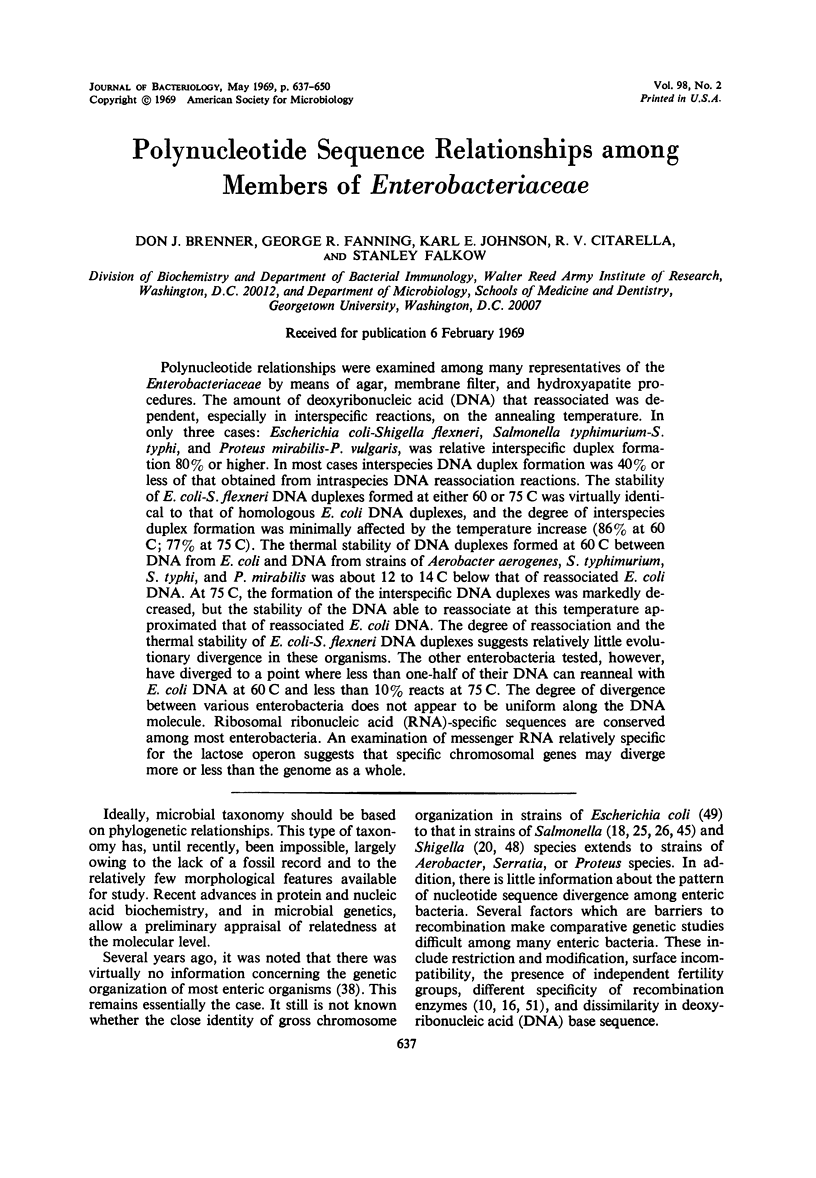
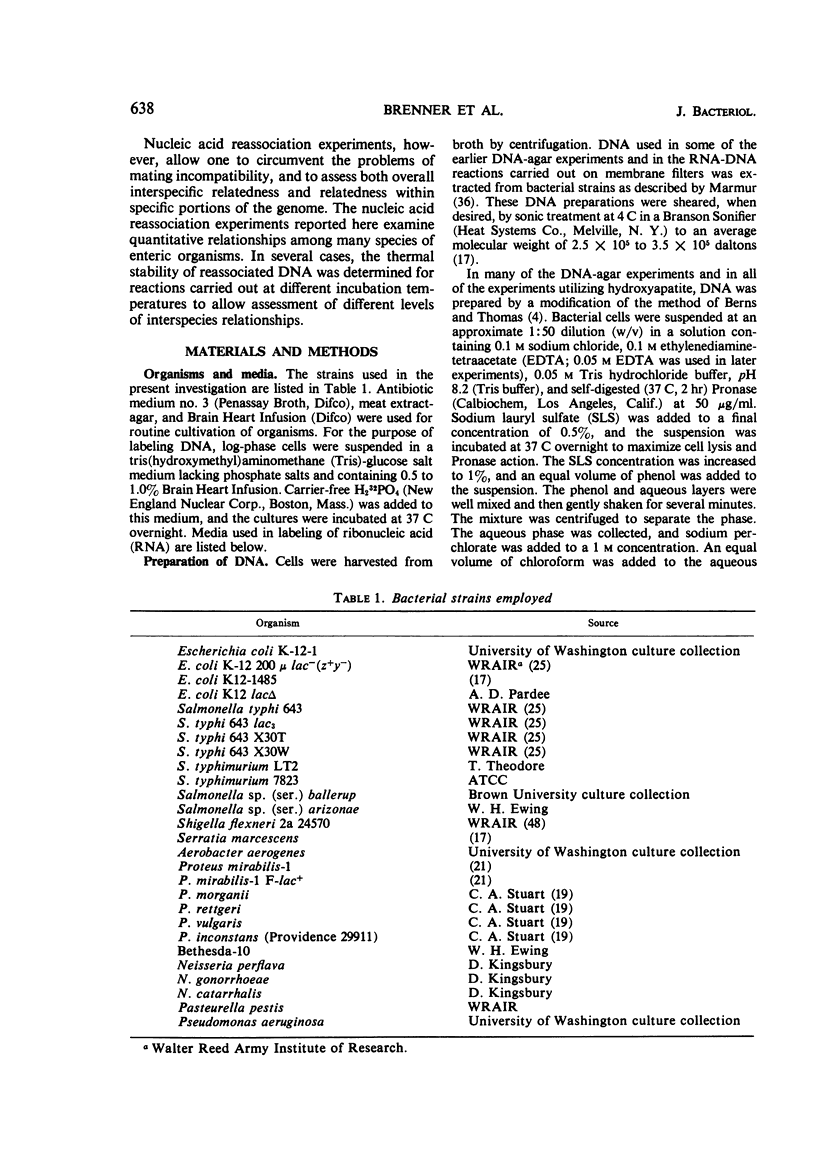
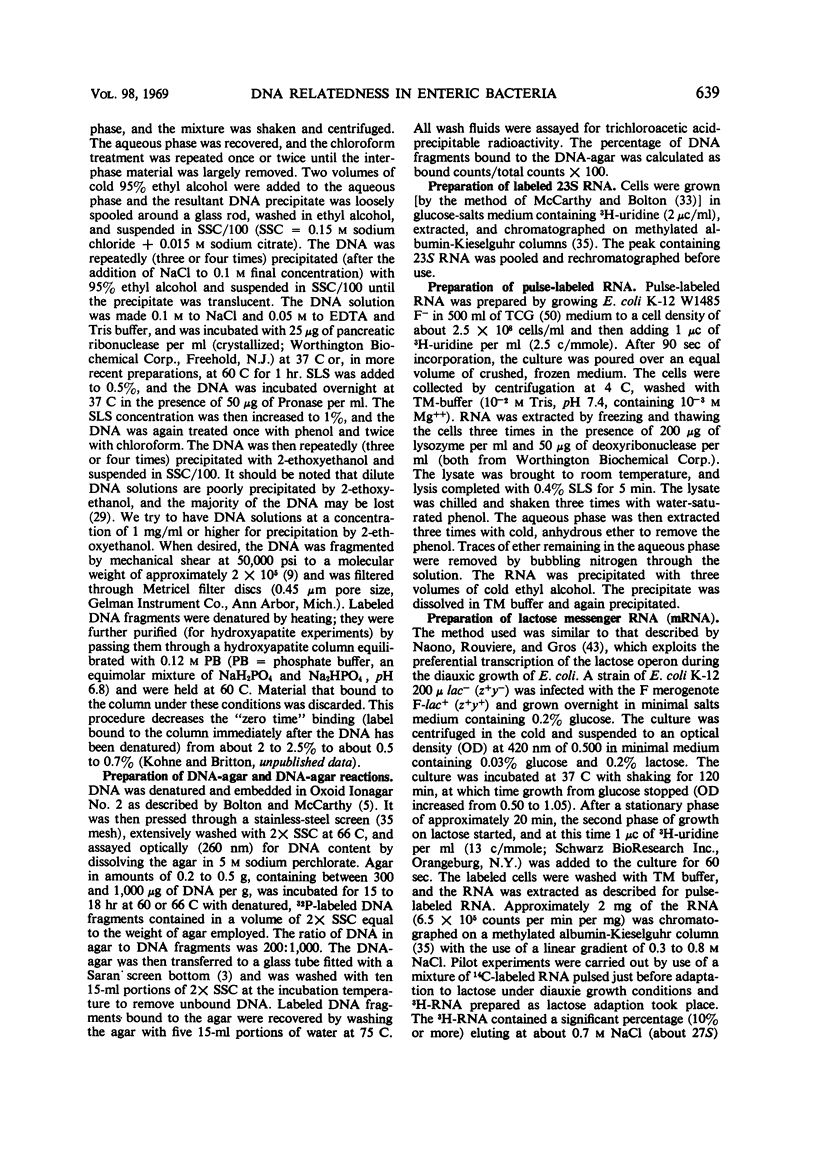
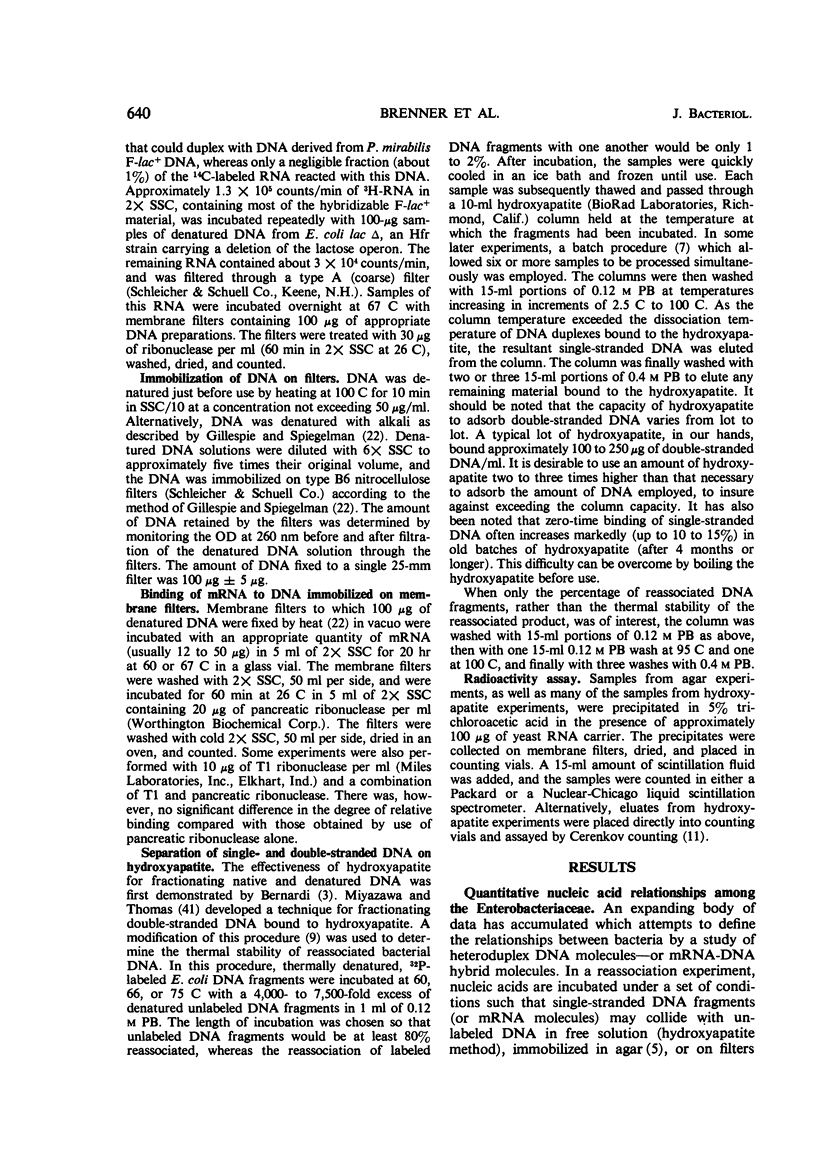
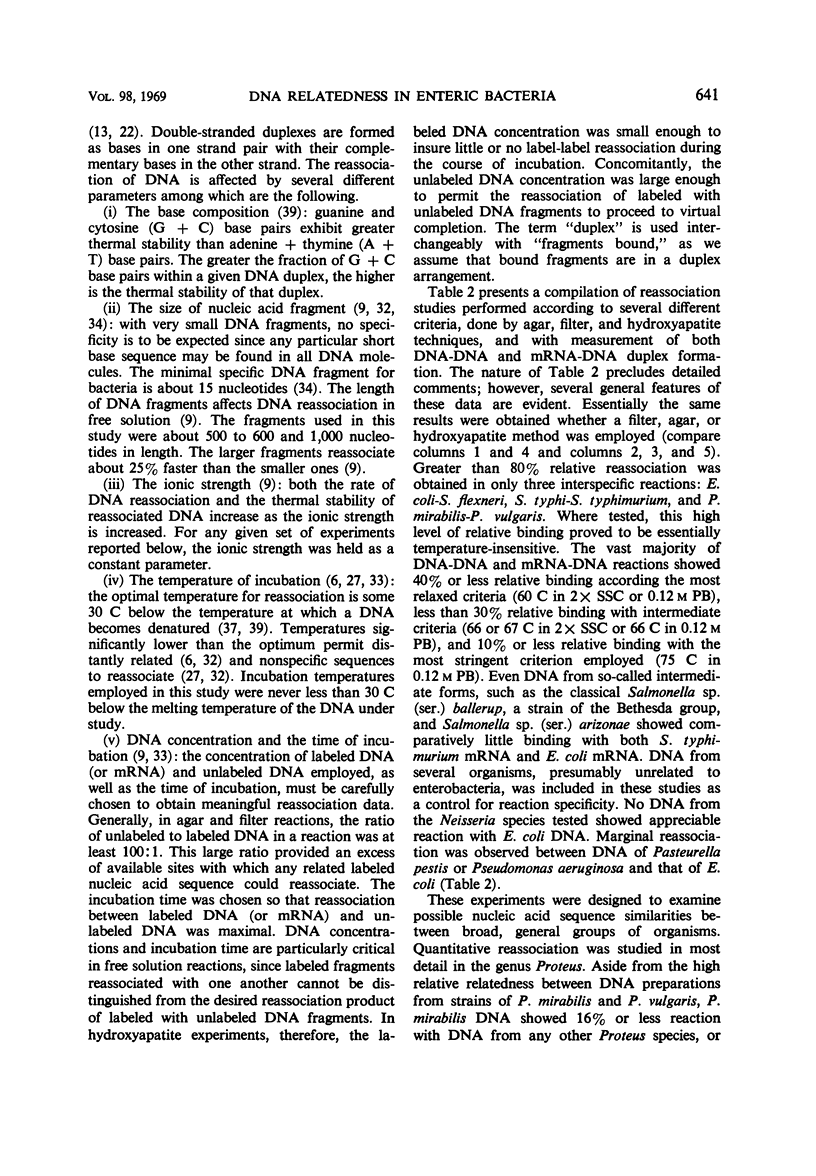
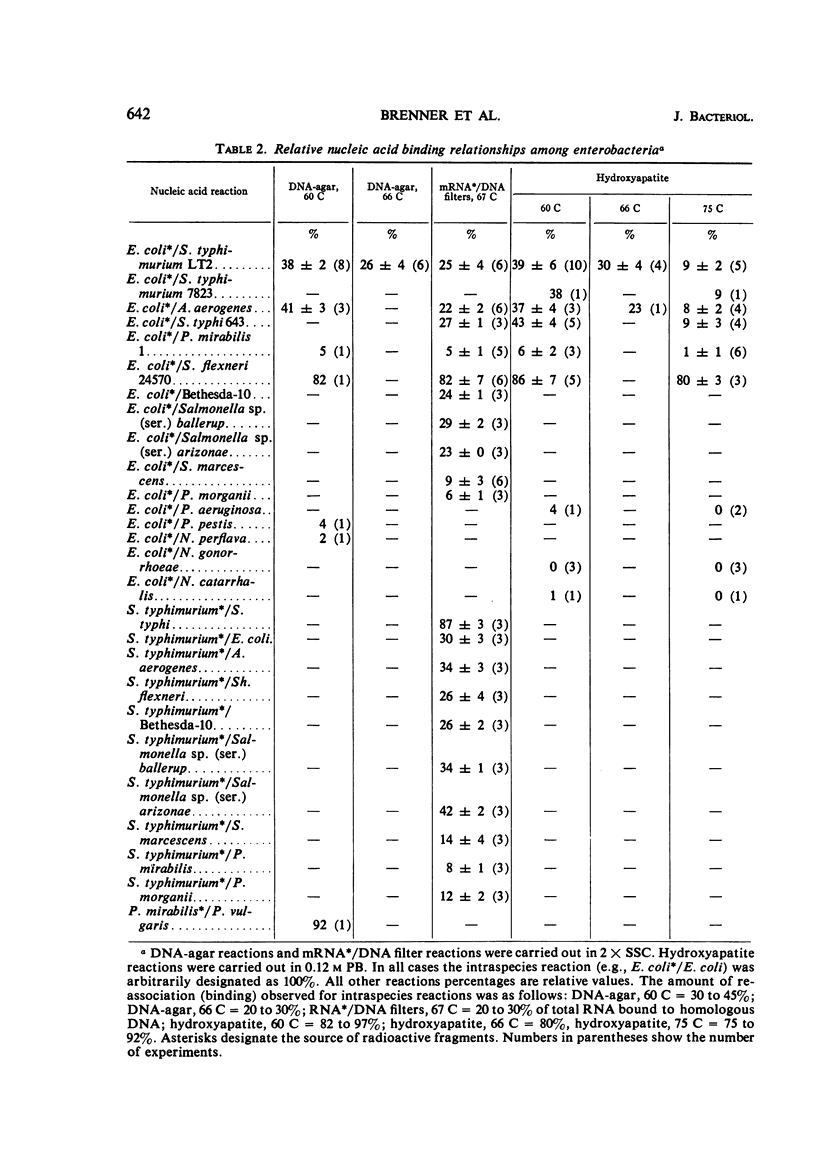
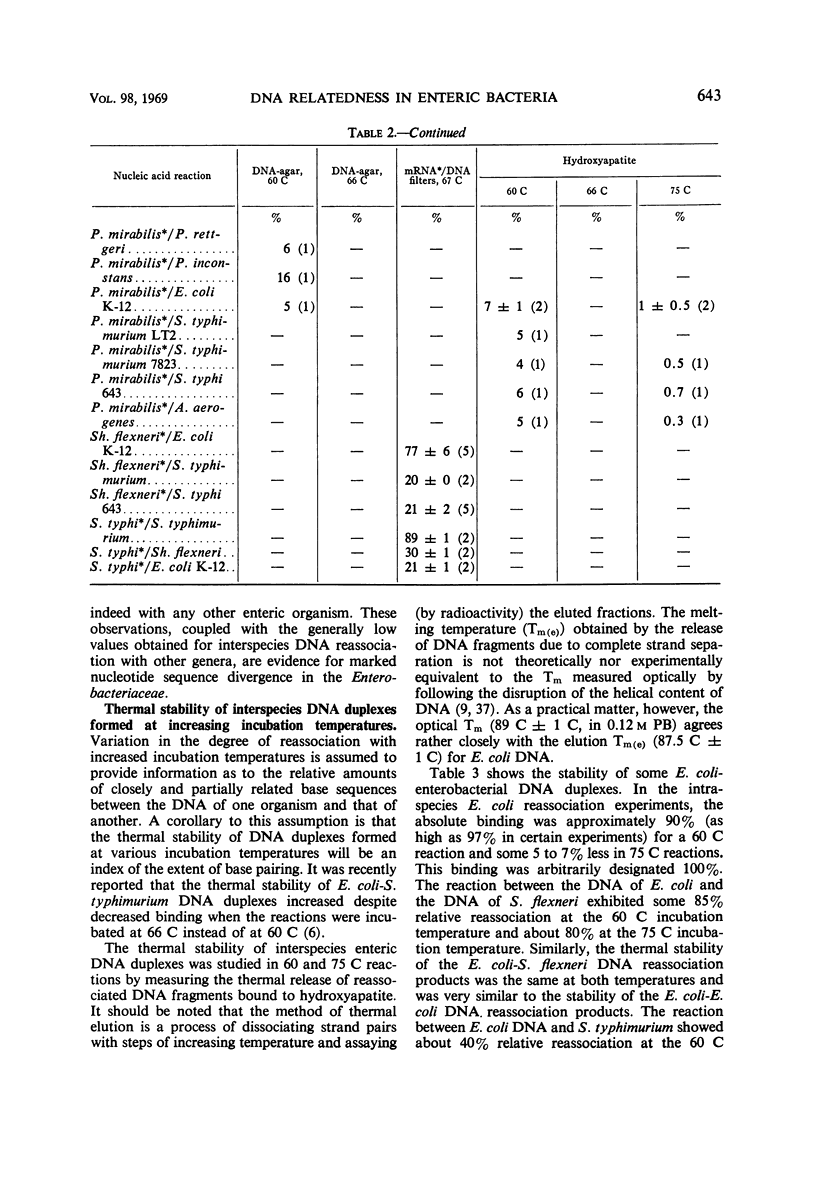
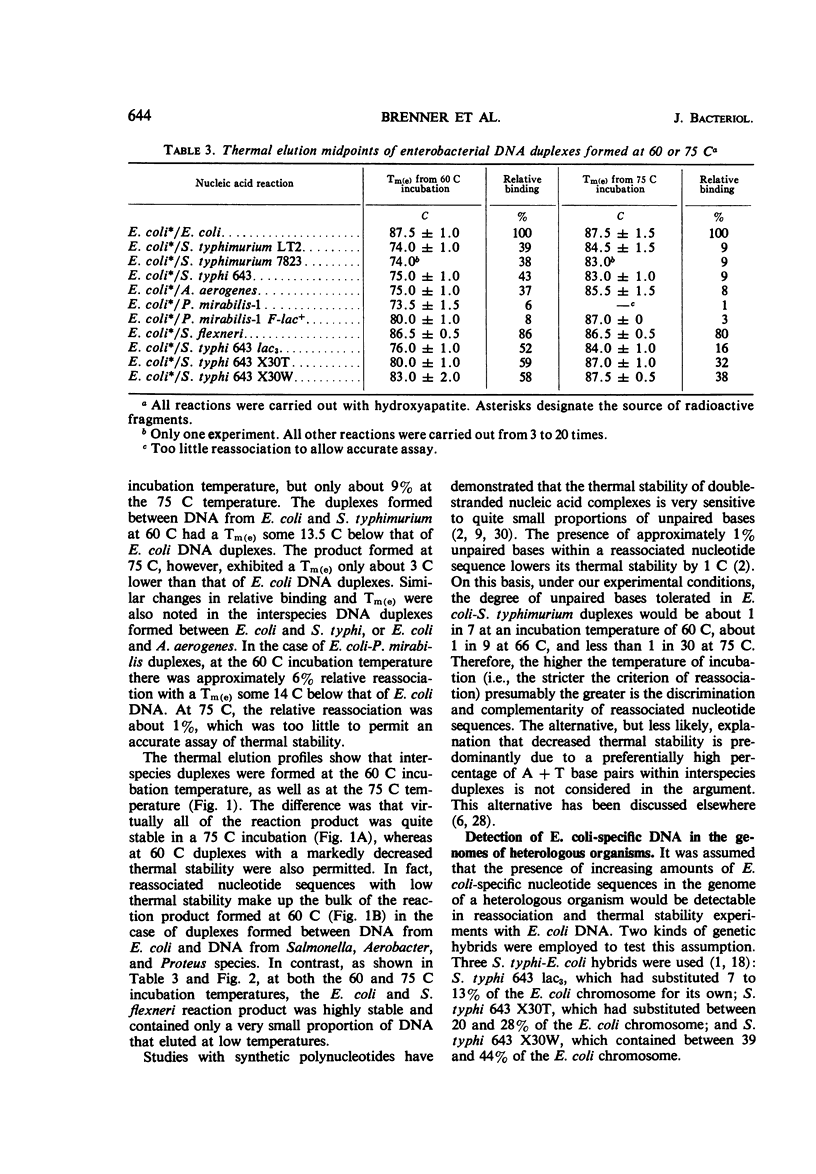
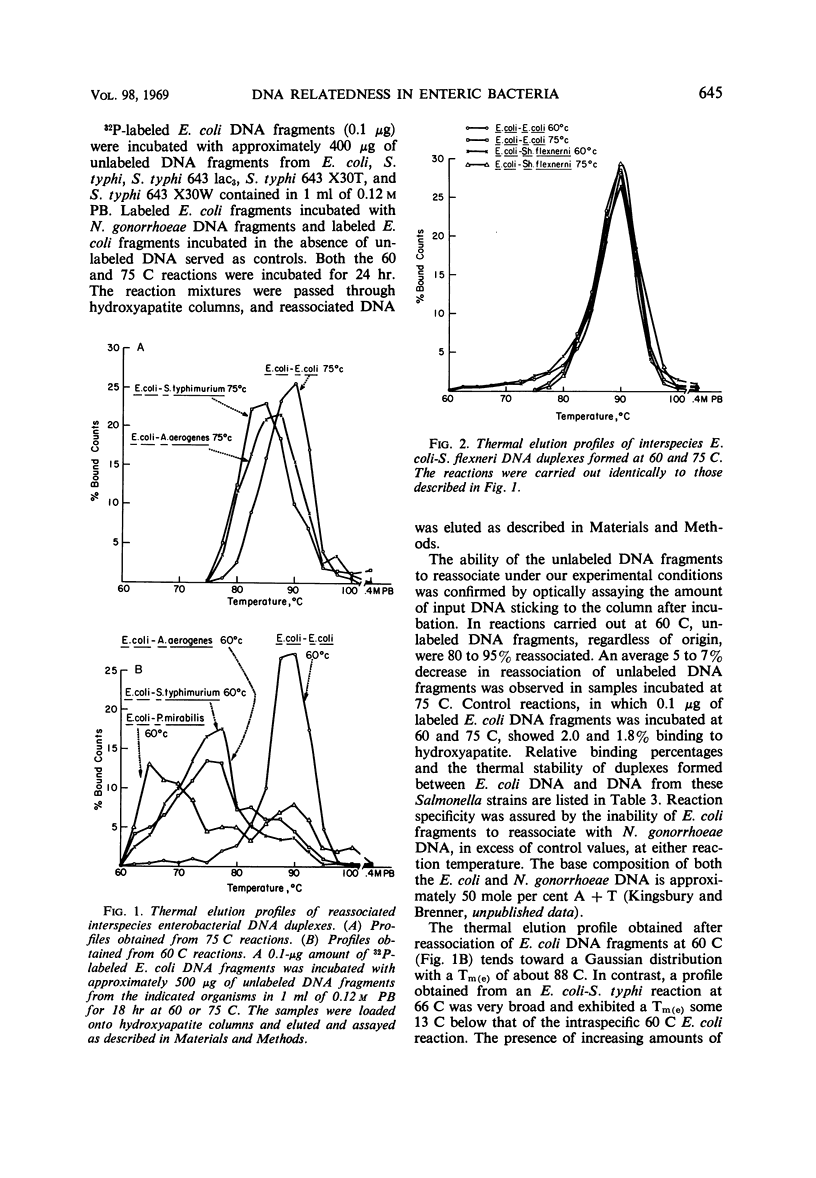
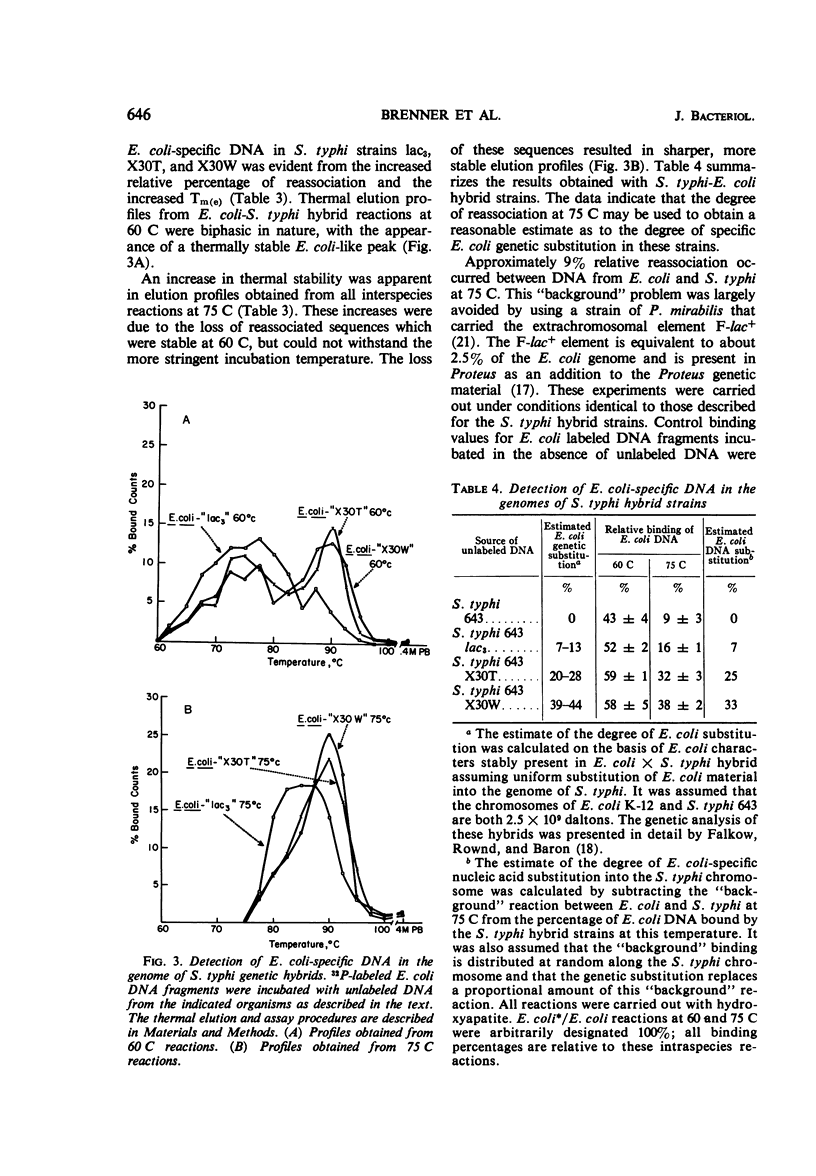
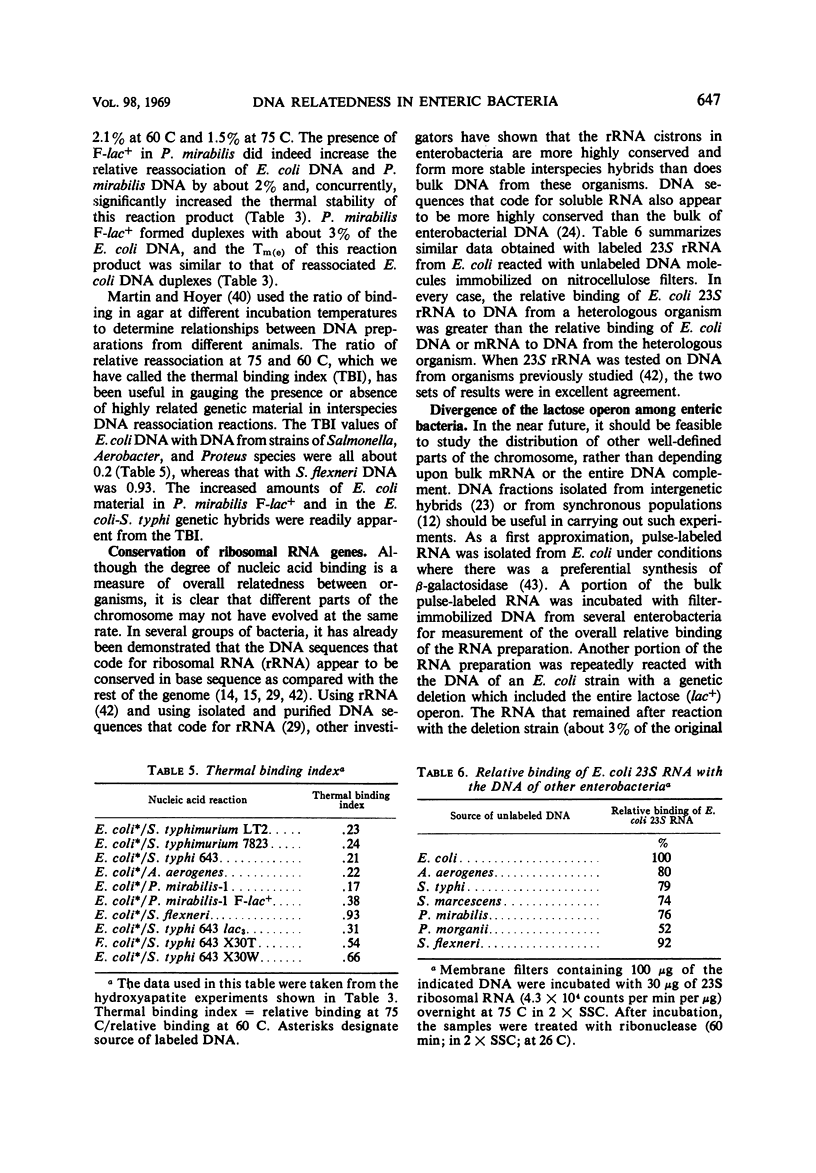
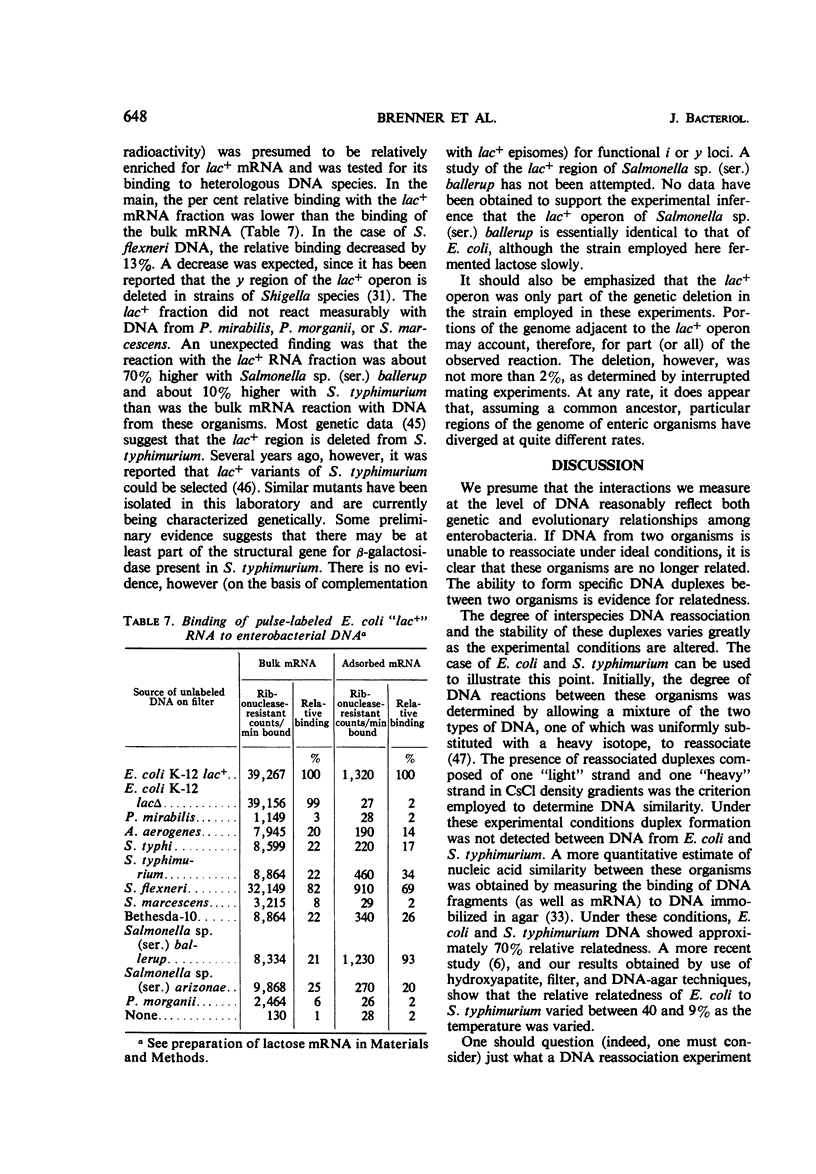
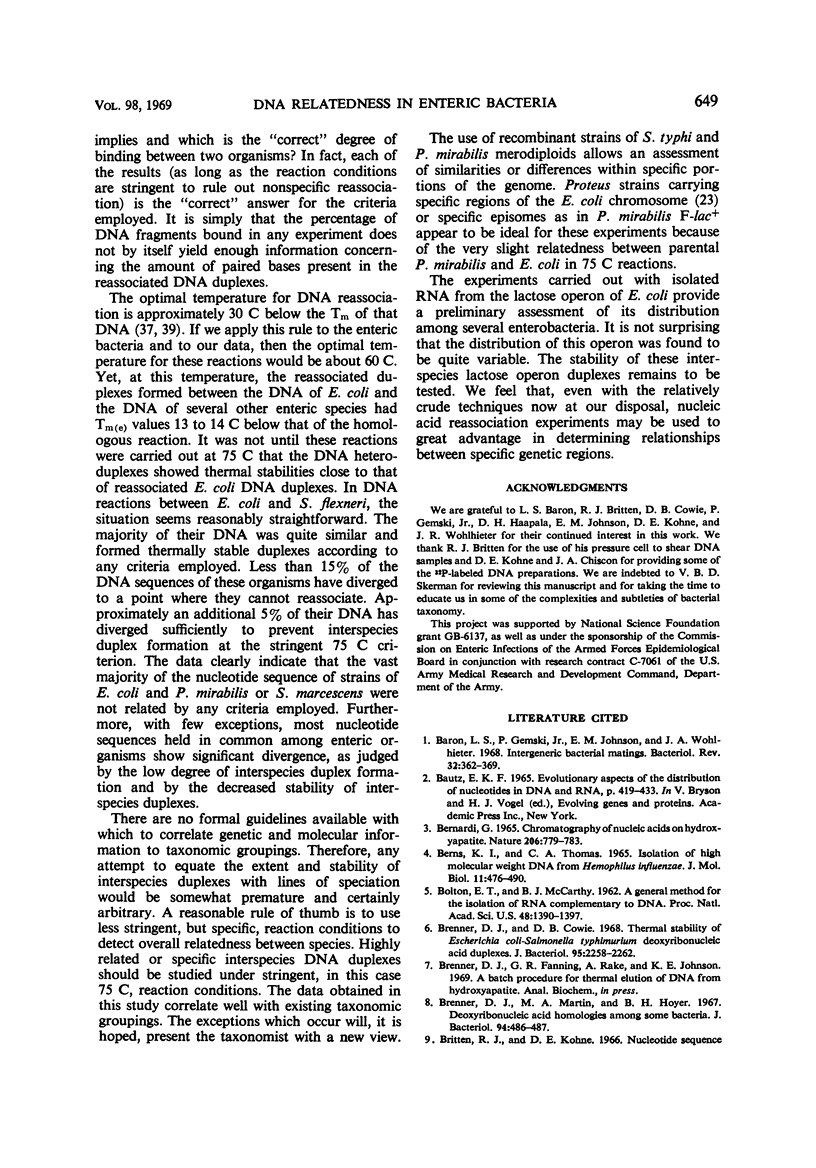
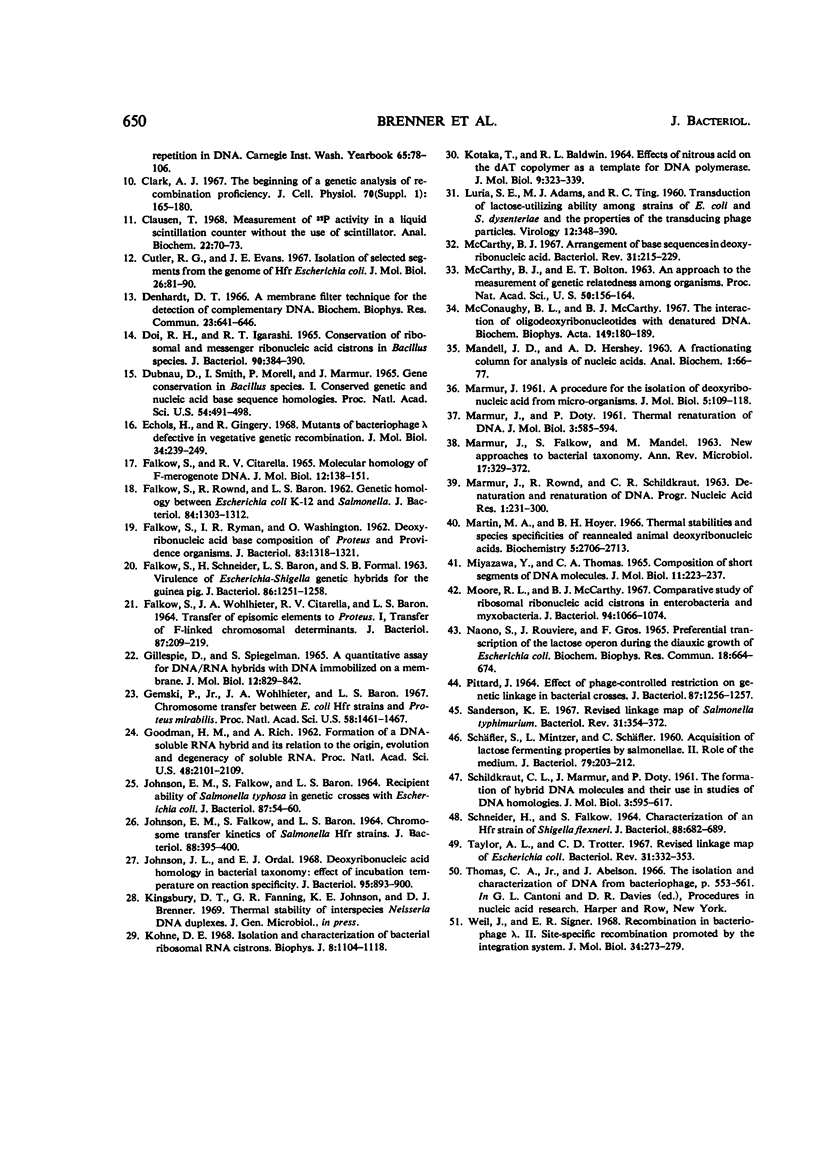
Selected References
These references are in PubMed. This may not be the complete list of references from this article.
- BERNS K. I., THOMAS C. A., Jr ISOLATION OF HIGH MOLECULAR WEIGHT DNA FROM HEMOPHILUS INFLUENZAE. J Mol Biol. 1965 Mar;11:476–490. doi: 10.1016/s0022-2836(65)80004-3. [DOI] [PubMed] [Google Scholar]
- BOLTON E. T., McCARTHY B. J. A general method for the isolation of RNA complementary to DNA. Proc Natl Acad Sci U S A. 1962 Aug;48:1390–1397. doi: 10.1073/pnas.48.8.1390. [DOI] [PMC free article] [PubMed] [Google Scholar]
- Baron L. S., Gemski P., Johnson E. M., Wohlhieter J. A. Intergeneric bacterial matings. Bacteriol Rev. 1968 Dec;32(4 Pt 1):362–369. [PMC free article] [PubMed] [Google Scholar]
- Bernardi G. Chromatography of nucleic acids on hydroxyapatite. Nature. 1965 May 22;206(4986):779–783. doi: 10.1038/206779a0. [DOI] [PubMed] [Google Scholar]
- Brenner D. J., Cowie D. B. Thermal stability of Escherichia coli-Salmonella typhimurium deoxyribocleic acid duplexes. J Bacteriol. 1968 Jun;95(6):2258–2262. doi: 10.1128/jb.95.6.2258-2262.1968. [DOI] [PMC free article] [PubMed] [Google Scholar]
- Brenner D. J., Martin M. A., Hoyer B. H. Deoxyribonucleic acid homologies among some bacteria. J Bacteriol. 1967 Aug;94(2):486–487. doi: 10.1128/jb.94.2.486-487.1967. [DOI] [PMC free article] [PubMed] [Google Scholar]
- Clark A. J. The beginning of a genetic analysis of recombination proficiency. J Cell Physiol. 1967 Oct;70(2 Suppl):165–180. doi: 10.1002/jcp.1040700412. [DOI] [PubMed] [Google Scholar]
- Clausen T. Measurement of 32P activity in a liquid scintillation counter without the use of scintillator. Anal Biochem. 1968 Jan;22(1):70–73. doi: 10.1016/0003-2697(68)90260-1. [DOI] [PubMed] [Google Scholar]
- Cutler R. G., Evans J. E. Isolation of selected segments from the genome of Hfr Escherichia coli. J Mol Biol. 1967 May 28;26(1):81–90. doi: 10.1016/0022-2836(67)90262-8. [DOI] [PubMed] [Google Scholar]
- DOI R. H., IGARASHI R. T. CONSERVATION OF RIBOSOMAL AND MESSENGER RIBONUCLEIC ACID CISTRONS IN BACILLUS SPECIES. J Bacteriol. 1965 Aug;90:384–390. doi: 10.1128/jb.90.2.384-390.1965. [DOI] [PMC free article] [PubMed] [Google Scholar]
- Denhardt D. T. A membrane-filter technique for the detection of complementary DNA. Biochem Biophys Res Commun. 1966 Jun 13;23(5):641–646. doi: 10.1016/0006-291x(66)90447-5. [DOI] [PubMed] [Google Scholar]
- Dubnau D., Smith I., Morell P., Marmur J. Gene conservation in Bacillus species. I. Conserved genetic and nucleic acid base sequence homologies. Proc Natl Acad Sci U S A. 1965 Aug;54(2):491–498. doi: 10.1073/pnas.54.2.491. [DOI] [PMC free article] [PubMed] [Google Scholar]
- Echolas H., Gingery R. Mutants of bacteriophage lambda defective in vegetative genetic recombination. J Mol Biol. 1968 Jul 14;34(2):239–249. doi: 10.1016/0022-2836(68)90249-0. [DOI] [PubMed] [Google Scholar]
- FALKOW S., CITARELLA R. V. MOLECULAR HOMOLOGY OF F-MEROGENOTE DNA. J Mol Biol. 1965 May;12:138–151. doi: 10.1016/s0022-2836(65)80288-1. [DOI] [PubMed] [Google Scholar]
- FALKOW S., RYMAN I. R., WASHINGTON O. Deoxyribonucleic acid base composition of Proteus and Providence organisms. J Bacteriol. 1962 Jun;83:1318–1321. doi: 10.1128/jb.83.6.1318-1321.1962. [DOI] [PMC free article] [PubMed] [Google Scholar]
- FALKOW S., SCHNEIDER H., BARON L. S., FORMAL S. B. VIRULENCE OF ESCHERICHIA-SHIGELLA GENETIC HYBRIDS FOR THE GUINEA PIG. J Bacteriol. 1963 Dec;86:1251–1258. doi: 10.1128/jb.86.6.1251-1258.1963. [DOI] [PMC free article] [PubMed] [Google Scholar]
- FALKOW S., WOHLHIETER J. A., CITARELLA R. V., BARON L. S. TRANSFER OF EPISOMIC ELEMENTS TO PROTEUS. I. TRANSFER OF F-LINKED CHROMOSOMAL DETERMINANTS. J Bacteriol. 1964 Jan;87:209–219. doi: 10.1128/jb.87.1.209-219.1964. [DOI] [PMC free article] [PubMed] [Google Scholar]
- Falkow S., Rownd R., Baron L. S. GENETIC HOMOLOGY BETWEEN ESCHERICHIA COLI K-12 AND SALMONELLA. J Bacteriol. 1962 Dec;84(6):1303–1312. doi: 10.1128/jb.84.6.1303-1312.1962. [DOI] [PMC free article] [PubMed] [Google Scholar]
- GOODMAN H. M., RICH A. Formation of a DNA-soluble RNA hybrid and its relation to the origin, evolution, and degeneracy of soluble RNA. Proc Natl Acad Sci U S A. 1962 Dec 15;48:2101–2109. doi: 10.1073/pnas.48.12.2101. [DOI] [PMC free article] [PubMed] [Google Scholar]
- Gemski P., Jr, Wohlhieter J. A., Baron L. S. Chromosome transfer between Escherichia coli HFR strains and Proteus mirabilis. Proc Natl Acad Sci U S A. 1967 Oct;58(4):1461–1467. doi: 10.1073/pnas.58.4.1461. [DOI] [PMC free article] [PubMed] [Google Scholar]
- Gillespie D., Spiegelman S. A quantitative assay for DNA-RNA hybrids with DNA immobilized on a membrane. J Mol Biol. 1965 Jul;12(3):829–842. doi: 10.1016/s0022-2836(65)80331-x. [DOI] [PubMed] [Google Scholar]
- JOHNSON E. M., FALKOW S., BARON L. S. CHROMOSOME TRANSFER KINETICS OF SALMONELLA HFR STRAINS. J Bacteriol. 1964 Aug;88:395–400. doi: 10.1128/jb.88.2.395-400.1964. [DOI] [PMC free article] [PubMed] [Google Scholar]
- JOHNSON E. M., FALKOW S., BARON L. S. RECIPIENT ABILITY OF SALMONELLA TYPHOSA IN GENETIC CROSSES WITH ESCHERICHIA COLI. J Bacteriol. 1964 Jan;87:54–60. doi: 10.1128/jb.87.1.54-60.1964. [DOI] [PMC free article] [PubMed] [Google Scholar]
- Johnson J. L., Ordal E. J. Deoxyribonucleic acid homology in bacterial taxonomy: effect of incubation temperature on reaction specificity. J Bacteriol. 1968 Mar;95(3):893–900. doi: 10.1128/jb.95.3.893-900.1968. [DOI] [PMC free article] [PubMed] [Google Scholar]
- KOTAKA T., BALDWIN R. L. EFFECTS OF NITROUS ACID ON THE DAT COPOLYMER AS A TEMPLATE FOR DNA POLYMERASE. J Mol Biol. 1964 Aug;9:323–339. doi: 10.1016/s0022-2836(64)80210-2. [DOI] [PubMed] [Google Scholar]
- Kohne D. E. Isolation and characterization of bacterial ribosomal RNA cistrons. Biophys J. 1968 Oct;8(10):1104–1118. doi: 10.1016/S0006-3495(68)86542-7. [DOI] [PMC free article] [PubMed] [Google Scholar]
- LURIA S. E., ADAMS J. N., TING R. C. Transduction of lactose-utilizing ability among strains of E. coli and S. dysenteriae and the properties of the transducing phage particles. Virology. 1960 Nov;12:348–390. doi: 10.1016/0042-6822(60)90161-6. [DOI] [PubMed] [Google Scholar]
- MANDELL J. D., HERSHEY A. D. A fractionating column for analysis of nucleic acids. Anal Biochem. 1960 Jun;1:66–77. doi: 10.1016/0003-2697(60)90020-8. [DOI] [PubMed] [Google Scholar]
- MARMUR J., DOTY P. Determination of the base composition of deoxyribonucleic acid from its thermal denaturation temperature. J Mol Biol. 1962 Jul;5:109–118. doi: 10.1016/s0022-2836(62)80066-7. [DOI] [PubMed] [Google Scholar]
- MARMUR J., DOTY P. Thermal renaturation of deoxyribonucleic acids. J Mol Biol. 1961 Oct;3:585–594. doi: 10.1016/s0022-2836(61)80023-5. [DOI] [PubMed] [Google Scholar]
- MARMUR J., FALKOW S., MANDEL M. NEW APPROACHES TO BACTERIAL TAXONOMY. Annu Rev Microbiol. 1963;17:329–372. doi: 10.1146/annurev.mi.17.100163.001553. [DOI] [PubMed] [Google Scholar]
- MCCARTHY B. J., BOLTON E. T. An approach to the measurement of genetic relatedness among organisms. Proc Natl Acad Sci U S A. 1963 Jul;50:156–164. doi: 10.1073/pnas.50.1.156. [DOI] [PMC free article] [PubMed] [Google Scholar]
- MIYAZAWA Y., THOMAS C. A., Jr NUCLEOTIDE COMPOSITION OF SHORT SEGMENTS OF DNA MOLECULES. J Mol Biol. 1965 Feb;11:223–237. doi: 10.1016/s0022-2836(65)80053-5. [DOI] [PubMed] [Google Scholar]
- Martin M. A., Hoyer B. H. Thermal stabilities and species specificities of reannealed animal deoxyribonucleic acids. Biochemistry. 1966 Aug;5(8):2706–2713. doi: 10.1021/bi00872a030. [DOI] [PubMed] [Google Scholar]
- McCarthy B. J. Arrangement of base sequences in deoxyribonucleic Acid. Bacteriol Rev. 1967 Dec;31(4):215–229. doi: 10.1128/br.31.4.215-229.1967. [DOI] [PMC free article] [PubMed] [Google Scholar]
- McConaughy B. L., McCarthy B. J. The interaction of oligodeoxynucleotides with denatured DNA. Biochim Biophys Acta. 1967 Nov 21;149(1):180–189. doi: 10.1016/0005-2787(67)90700-9. [DOI] [PubMed] [Google Scholar]
- Moore R. L., McCarthy B. J. Comparative study of ribosomal ribonucleic acid cistrons in enterobacteria and myxobacteria. J Bacteriol. 1967 Oct;94(4):1066–1074. doi: 10.1128/jb.94.4.1066-1074.1967. [DOI] [PMC free article] [PubMed] [Google Scholar]
- Pittard J. Effect of phage-controlled restriction on genetic linkage in bacterial crosses. J Bacteriol. 1964 May;87(5):1256–1257. doi: 10.1128/jb.87.5.1256-1257.1964. [DOI] [PMC free article] [PubMed] [Google Scholar]
- SCHAFLER S., MINTZER L., SCHAFLER C. Acquisition of lactose fermenting properties by salmonellae. II. Role of the medium. J Bacteriol. 1960 Feb;79:203–212. doi: 10.1128/jb.79.2.203-212.1960. [DOI] [PMC free article] [PubMed] [Google Scholar]
- SCHILDKRAUT C. L., MARMUR J., DOTY P. The formation of hybrid DNA molecules and their use in studies of DNA homologies. J Mol Biol. 1961 Oct;3:595–617. doi: 10.1016/s0022-2836(61)80024-7. [DOI] [PubMed] [Google Scholar]
- SCHNEIDER H., FALKOW S. CHARACTERIZATION OF AN HFR STRAIN OF SHIGELLA FLEXNERI. J Bacteriol. 1964 Sep;88:682–689. doi: 10.1128/jb.88.3.682-689.1964. [DOI] [PMC free article] [PubMed] [Google Scholar]
- Sanderson K. E. Revised linkage map of Salmonella typhimurium. Bacteriol Rev. 1967 Dec;31(4):354–372. doi: 10.1128/br.31.4.354-372.1967. [DOI] [PMC free article] [PubMed] [Google Scholar]
- Taylor A. L., Trotter C. D. Revised linkage map of Escherichia coli. Bacteriol Rev. 1967 Dec;31(4):332–353. doi: 10.1128/br.31.4.332-353.1967. [DOI] [PMC free article] [PubMed] [Google Scholar]
- Weil J., Signer E. R. Recombination in bacteriophage lambda. II. Site-specific recombination promoted by the integration system. J Mol Biol. 1968 Jul 14;34(2):273–279. doi: 10.1016/0022-2836(68)90252-0. [DOI] [PubMed] [Google Scholar]


